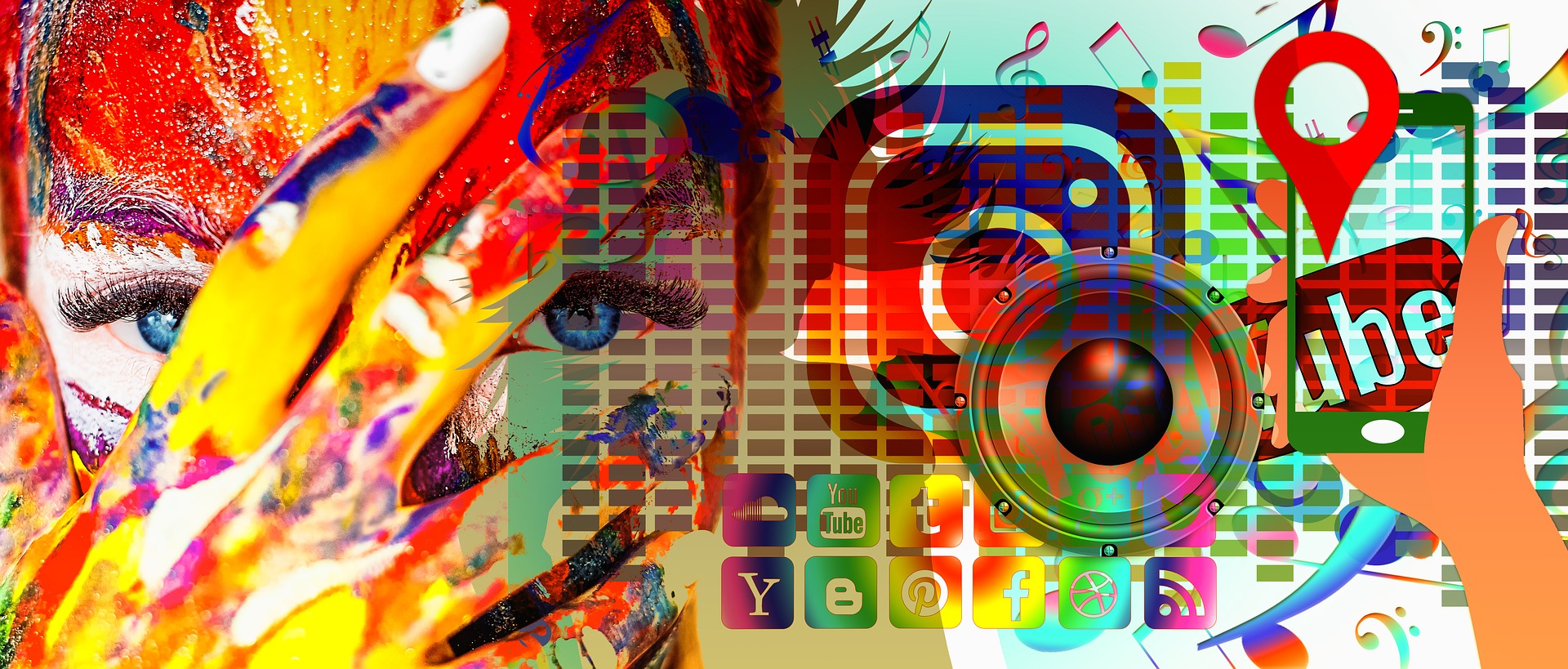
A very common conversation, especially these past few months, has revolved around what to watch on streaming TV. Netflix, of course, is the dominant player in this game, so the choices most often revolve around what’s on their menu of movies, shows, documentaries, and other video material.
I won’t bore you with my recommendations (lately I’ve been watching a Scandinavian cop show with subtitles). But one popular Netflix documentary that’s always good for some comments and controversy is The Social Dilemma.
Maybe you’ve seen it, but maybe you haven’t. It’s a good use of your 90 minutes, a Sundance documentary released in January of this year (yes, pre-COVID).
It was produced by Jeff Orlowski, who also made the climate change-ish docs Chasing Ice and Chasing Coral.
Here’s the trailer:
A rotating slogan: “The technology that connects us also controls/monetizes/divides/distracts/manipulates/polarizes us” is what the documentary is primarily about.
It leans heavily on revealing interviews with some of the pioneers of social media companies, some of whom are responsible for many of the platforms we routinely use today.
Many of them have “coder’s remorse” – concerned the original intent of their innovations have flipped over into a dark side.
Yes, the documentary takes a “hair on fire” approach that may get on your nerves, especially if you have a strong understanding of the social space.
I checked in with Lori Lewis about The Social Dilemma, and sure enough she has reservations about its veracity. To whit, she wrote about the doc in a  recent “Merge” column appearing in AllAccess.
recent “Merge” column appearing in AllAccess.
Lori took exception to the premise that social “news feeds” are designed to be addicting, referring to Facebook’s ranking changes in 2018 that prioritized more “meaningful social interactions.”
Lori noted that change cost Facebook 50 million hours in a day in TSS – “time spent socializing.”
The doc also focuses on the addicting nature of social. And Lori’s point is that “algorithms don’t create addiction – a lack of discipline does.”
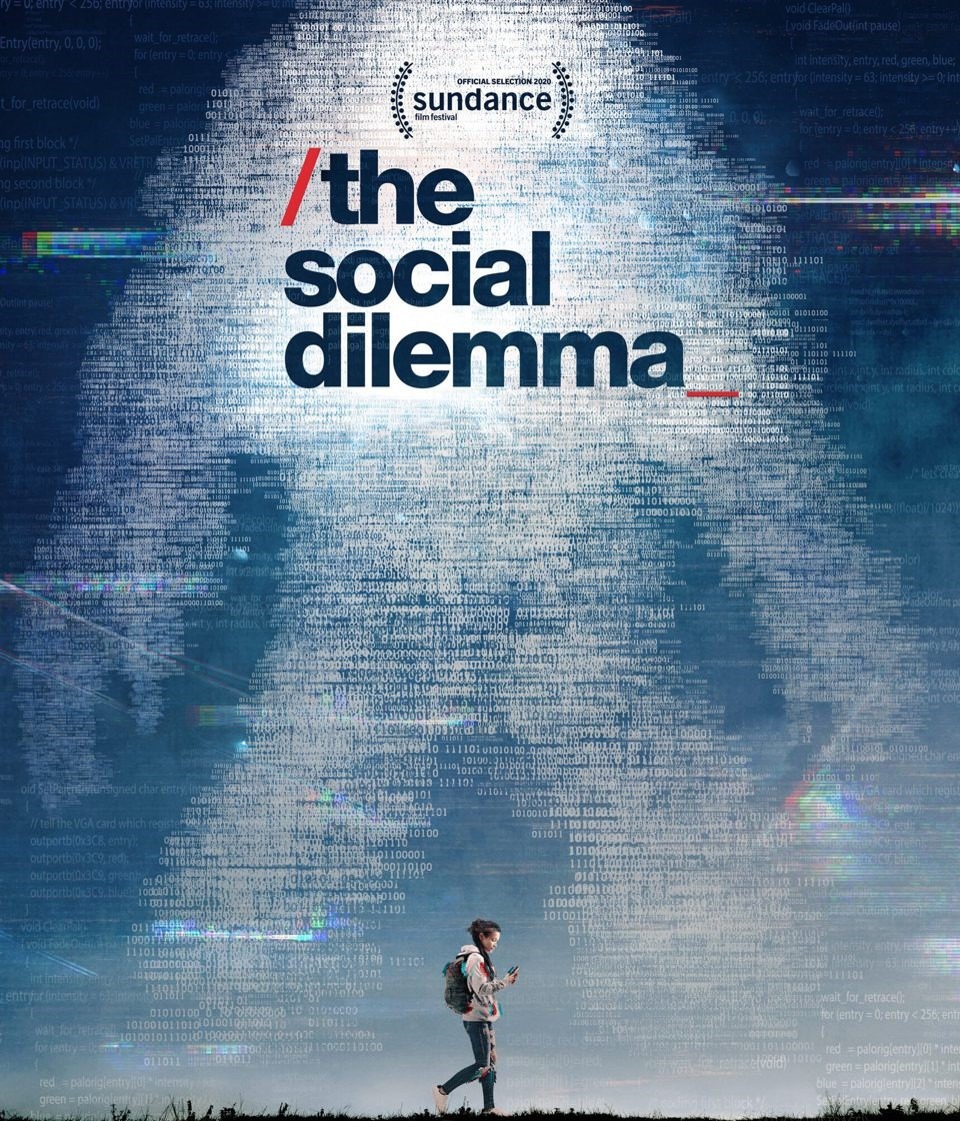 Perception, of course, is reality, and The Social Dilemma focuses much of its energies on the human effects of platforms like Facebook, Twitter, and Instagram on society – especially kids.
Perception, of course, is reality, and The Social Dilemma focuses much of its energies on the human effects of platforms like Facebook, Twitter, and Instagram on society – especially kids.
The beauty of the doc is that it drills down complex concepts like algorithms and privacy and put them into human terms. An ongoing fictionalized story that weaves through the doc can get preachy, but it makes its point that social media can, in fact, do harm.
And there are lots of regular folks who will see this doc and walk away with those conclusions. Right around when it was released, we conducted Techsurvey 2020. It’s pre-pandemic field dates – January/February – give us a glimpse at how radio fans perceived social just before the March lockdown.
As it turned out, an agree/disagree statement about social captured the big question that permeates Orlowski’s documentary:
“Social media does more bad than good”
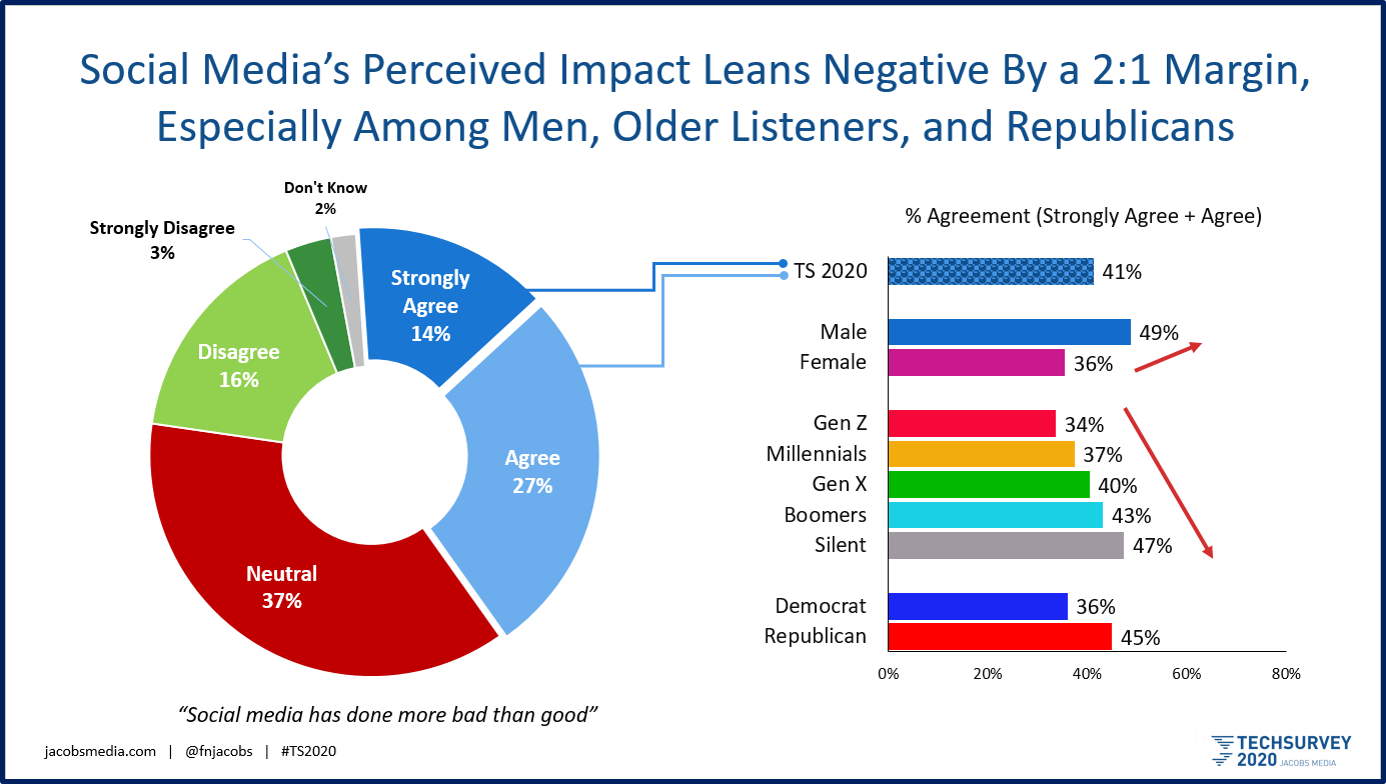
We learned about four in ten Techsurvey respondents are skeptical about the impact of social. And because it is an election year, we also asked about political affiliation. You can see how Republican survey takers have a more jaundiced view of social, especially given the finger-pointing that occurred about alleged Russian interference in the 2016 election.
One of Facebook’s founders, Roger McNamee, makes the point in The Social Dilemma that Facebook actually wasn’t hacked by Russia (or anyone else). They simply used the tools provided by Facebook to target the users they were seeking in order to further their election agenda.
Have opinions about social media changed in the ensuing months as the U.S. and the world has been ravaged by the coronavirus outbreak? I ran across a newly released survey from the Pew Research Center.
Conducted in July, only about one in ten American views social media as mostly positive, while nearly two-thirds content its impact has been mostly negative – clearly a darker view than what we saw earlier this year.
And similar to what we saw in Techsurvey, Republicans and older respondents (those 30+) tend to have a more negative predisposition about social media.
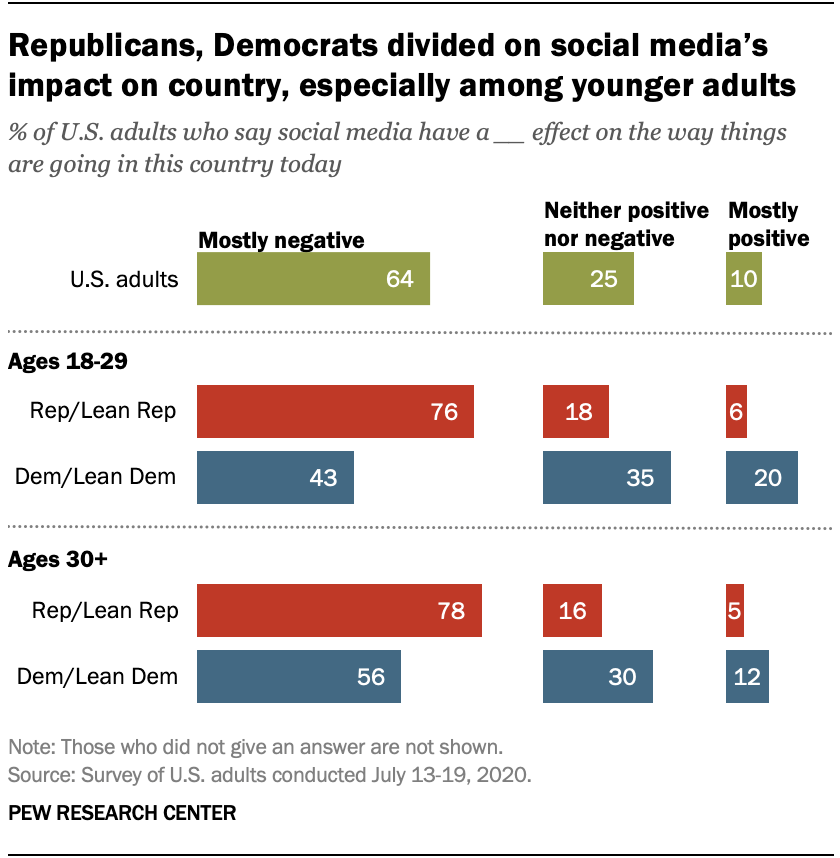
Earlier this week, the FBI and government agencies revealed new plots and strategies – again by Russia and also by Iran – to manipulate the Presidential election with carefully crafted, well-targeted messaging. As Ronald Reagan might have observed, “Here we go again.”
As The Social Dilemma graphically explains how both good and bad actors effectively use platforms like Facebook to surgically target their desired audiences, I couldn’t help but think we do pretty much the same thing in radio – as does every other ad-supported medium. The difference is that social media’s demographic and psychographic information is more dynamic, accessible, and more laser-focused. If radio sellers and marketers had this same level of data available to them and their clients, I’m confident they’d use it in similar ways.
And while radio is regulated by the FCC, the lack of boundary lines in social media creates a much more “Wild West” ecosystem. Will Congress continue its often wrong-headed investigations of social media companies and the titans who run them in 2021? Stay tuned.
As someone who’s been a user on several of these platforms a great deal over the years – and adding my learnings from working with Lori – I can’t say I was surprised by much of what I saw in The Social Dilemma. It’s well-done, sharply produced, and for people who simply jump on their phones and laptops without giving it much thought, it’s an eye-opener and thought-provoking.
The one quote that jumped out at me was this was from statistician Edward Tufte:
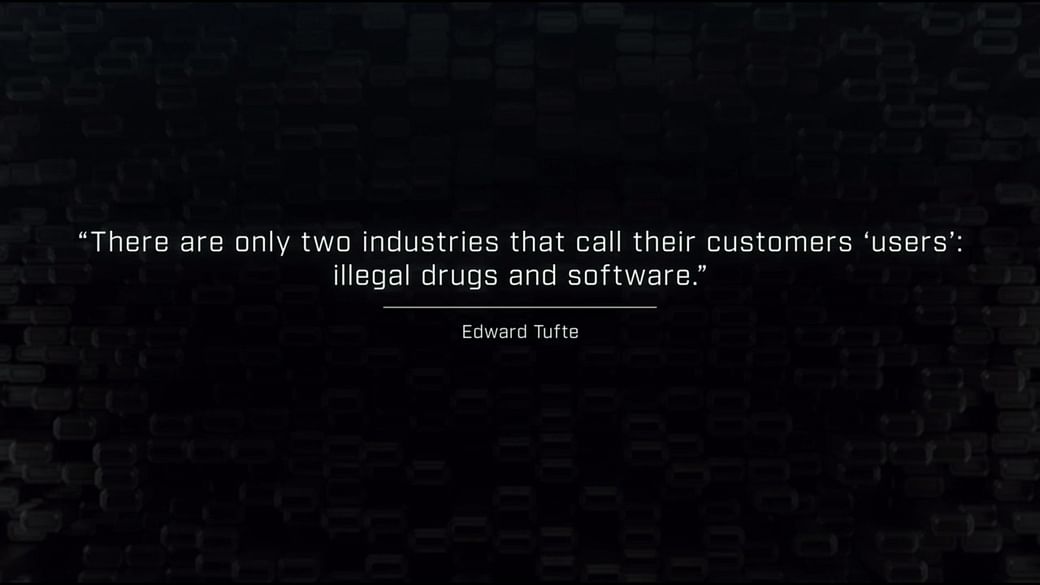
See you on Twitter.
- What To Do If Your Radio Station Goes Through A Midlife Crisis - April 25, 2025
- A 2020 Lesson?It Could All Be Gone In A Flash - April 24, 2025
- How AI Can Give Radio Personalities More…PERSONALITY - April 23, 2025




Love the Tufte quote. I attended one of his seminars a few years ago, he is brilliant. And you’ll recall the movie a decade ago that treated the genesis of Facebook, “The Social Network,” which I finally got around to seeing last month. It’s worth pondering what the author of the screenplay, Aaron Sorkin, said in a recent interview when asked about his present view of social media: “I don’t have any social media accounts for roughly the same reason I don’t sleep on a bed of broken glass at night.”
Fred,
Interesting perspective on Netflix’s “The Social Dilemma” film. I wrote about it on my blog a while back, but mainly from the point-of-view of sales & marketing. Here’s the link: https://dicktaylorblog.com/2020/09/20/the-better-advertising-mousetrap/
The challenge for broadcasters is outlined in this article.
Dick
Agree, a great documentary, Fred.
Since watching, I now second guess before clicking on stories, links, etc.
AND, every now & then I click on something I’d NEVER usually choose. Just to F – up their algorithms a bit.
😉
I’ve been doing some of that myself. Thanks JC.
A couple of things:
There’s a book that is kind of a bible for social media and app makers of all stripes, not just games. Hooked: How to Build Habit-Forming Products. The Little Yellow Book of Silicon Valley. There may be lessons there for all of us.
And I heard it said once that if you’re getting a product for free when you sign up …you’re actually the product. ie. You don’t have a Facebook account. Facebook has _your_ account. And more personal information about you than all of your family and closest friends combined.
“You are the product” is a point we’ve blogged about before. Anyone who thought social was a free ride with no “catches” was kidding themselves. The other piece of that is unlike radio, TV, print, our content is the product, too. Maybe reading the “Terms & Conditions” isn’t such a bad idea after all. Thanks for the comment, A.L.
“And Lori’s point is that “algorithms don’t create addiction – a lack of discipline does.”
That is a huge cop out.
We as a species are undisciplined and prone to addictions and technology has only exacerbated that. Companies know that and are taking advantage of us and it isn’t even a fair fight.
They have billions of dollars, knowledge of our habits and psychologies and the ability to focus on one aspect and how to exploit it.
Scientists are even finding Google is literally rewiring out brain by using it.
We are all fatter because the food companies have pumped in additional sugar which most people don’t realize.
The payoffs of slots at Casinos are based on experiments with rats and everything about them are designed to make you stay longer and play more.
This is not new. History is replete with examples but the pace has accelerated because the technology has made it easier to take advantage of it.
Saying we “lack discipline”, especially in this case is like saying, after losing a one on one game against Lebron James, that you didn’t train enough to beat him.
Mike, i expected more pushback on that comment. I see it both ways, especially for kids. Life is a series of temptations, whether it’s cigarettes, gambling, or smartphones. Not every adult is wired to be able to fend them off. And when it comes to children, if parents aren’t active managers, we know the result. Thanks for the comment to the contrary, Mike.
I think its just as possible to create and emotionally addicting product as a physically addicting one.
I believe you’re right. Not sure which is more powerul.
Jaron Lanier’s “You are not a Gadget” is a must read. It’s a bit dated at this point at (OMG) nine years old, but insanely insightful and infuriating at the same time.